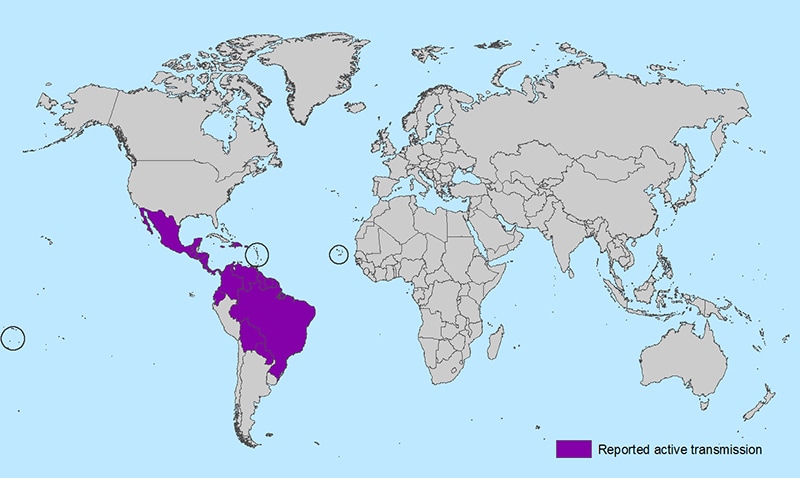[caption id="" align="alignnone" width="309"] cdc.gov[/caption]
News circulating about the Zika virus, a disease transmitted by Aedes mosquitoes that has triggered an international health alert, has caused some worry among Seton Hall community members who plan to travel abroad.
Medical experts suspect that one bite from an infected mosquito can cause a person to experience symptoms of the Zika virus, which include: red eyes, jointpain, fever, and malaise, which is linked to microcephaly in infants, according to Mary Ann Scharf, associate professor of the College of Nursing.
Scharf said that as of right now, the virus is not prevalent in New Jersey. However, according to the Centers for Disease Control and Prevention’s (CDC) findings, the mosquito that carries the virus exists everywhere in North and South America except Canada and Chile.
Some Seton Hall students will be traveling to areas in South and Central America over spring break on school related trips, and other students will be going on personal vacations to the Caribbean— all places where the virus has been confirmed.
There is a possibility that a person infected with Zika can carry the virus with them, as only one in five people show symptoms of the virus, according to the CDC.
Fasil Balchow, a student who in May plans to go on the Intercultural Communication in Nicaragua (COST2130) trip with associate professor Jon Radwan, chair of the Communication program, said that he is not too concerned with the dangers of the Zika virus.
“(The news) says that the first two cases have been laboratory-confirmed on January 27th. I had a friend who dropped out of going to Turkey this week because of a bomb that went off in the exact same place that he was supposed to go to,” Balchow said. “So I think that there are bigger things to worry about and I really feel like the media exaggerates outbreaks like this like the same way they did Ebola. So I’m not worried at all.”
The trip Balchow is attending runs from May 15 to May 29.
Radwan, who is running this trip, explained the impact that the Zika virus has on student enrollment of the program.
“Overall I’m concerned I won’t get enough students to run the trip,” Radwan said. “It’s obviously better to postpone the trip than it is to harm anyone.”
There is also a service trip through The Campus Ministry Division of Volunteer Efforts (DOVE) that is leaving this Saturday, Feb. 27 for El Salvador.
While there, students will interact with the local culture as well as enrich their faith through visiting historical Christian sites.
Amy Vandegriff, occupational therapy program freshman, is going on the service trip.
“There seems to be a lot of focus on the danger to pregnant people, but I’m still worried about the danger the virus poses to me,” Vandegriff said. “There’s a lot of uncertainties with the virus, too.”
For those who are planning on traveling during spring break, the CDC advises dressing in layers that cover the majority of your body. The type of mosquito that carries the Zika virus is active during the day. Travelers should be aware of the virus and wear mosquito repellent.
Megan O’Malley can be reached at megan.omalley@student.shu.edu.
cdc.gov[/caption]
News circulating about the Zika virus, a disease transmitted by Aedes mosquitoes that has triggered an international health alert, has caused some worry among Seton Hall community members who plan to travel abroad.
Medical experts suspect that one bite from an infected mosquito can cause a person to experience symptoms of the Zika virus, which include: red eyes, jointpain, fever, and malaise, which is linked to microcephaly in infants, according to Mary Ann Scharf, associate professor of the College of Nursing.
Scharf said that as of right now, the virus is not prevalent in New Jersey. However, according to the Centers for Disease Control and Prevention’s (CDC) findings, the mosquito that carries the virus exists everywhere in North and South America except Canada and Chile.
Some Seton Hall students will be traveling to areas in South and Central America over spring break on school related trips, and other students will be going on personal vacations to the Caribbean— all places where the virus has been confirmed.
There is a possibility that a person infected with Zika can carry the virus with them, as only one in five people show symptoms of the virus, according to the CDC.
Fasil Balchow, a student who in May plans to go on the Intercultural Communication in Nicaragua (COST2130) trip with associate professor Jon Radwan, chair of the Communication program, said that he is not too concerned with the dangers of the Zika virus.
“(The news) says that the first two cases have been laboratory-confirmed on January 27th. I had a friend who dropped out of going to Turkey this week because of a bomb that went off in the exact same place that he was supposed to go to,” Balchow said. “So I think that there are bigger things to worry about and I really feel like the media exaggerates outbreaks like this like the same way they did Ebola. So I’m not worried at all.”
The trip Balchow is attending runs from May 15 to May 29.
Radwan, who is running this trip, explained the impact that the Zika virus has on student enrollment of the program.
“Overall I’m concerned I won’t get enough students to run the trip,” Radwan said. “It’s obviously better to postpone the trip than it is to harm anyone.”
There is also a service trip through The Campus Ministry Division of Volunteer Efforts (DOVE) that is leaving this Saturday, Feb. 27 for El Salvador.
While there, students will interact with the local culture as well as enrich their faith through visiting historical Christian sites.
Amy Vandegriff, occupational therapy program freshman, is going on the service trip.
“There seems to be a lot of focus on the danger to pregnant people, but I’m still worried about the danger the virus poses to me,” Vandegriff said. “There’s a lot of uncertainties with the virus, too.”
For those who are planning on traveling during spring break, the CDC advises dressing in layers that cover the majority of your body. The type of mosquito that carries the Zika virus is active during the day. Travelers should be aware of the virus and wear mosquito repellent.
Megan O’Malley can be reached at megan.omalley@student.shu.edu.





